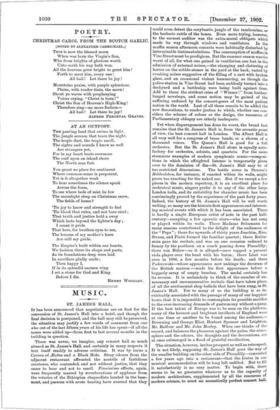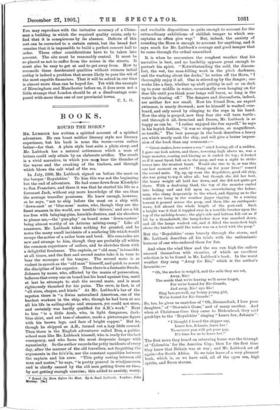MUSIC.
ST. JAMES'S HALL, IT has been announced that negotiations are on foot for the conversion of St. James's Hall into a hotel, and though the fmal decision is postponed, and the ball may still be preserved, the situation may justify a few words of comment from one who out of the last fifteen years of his life has spent—if all the hours were added up—from first to last several months in the building in question.
There was never, we imagine, any concert hall so much abused as St. James's Hail, and certainly in many respects it lent itself readily to adverse criticism. It was by turns a Cavern of &ohm and a Black Hole. Stray odours from the adjacent restaurant affronted the nostrils of fastidious amateurs, who contended, and not without justice, that they came to hear and not to smell. Pianissimo effects, again, were frequently marred by reverberations of applause from the votaries of the Ethiopian rhapsodists located in the base- ment, and persons with acute hearing have averred that they
could even detect the corybantic jangle of the tambonrine, o
the barbaric rattle of the bones. Even more trying, however,r, to the earnest auditor was the extra-mural obbligato which made its way. through windows and ventilators. In the muffin season afternoon concerts were habitually disturbed by interminable tintinnabulations. The consumption of muffins in Vine Street must be prodigious. But the summer season was the worst of all, for what one gained in ventilation one lost in the admission of external noises,—the stamping and clattering of horses on the cobble-stones in the yard at the back, varied by crashing noises suggestive of the filling of a cart with broken glass, and an occasional violent hammering, as though the police-station in Vine Street had been suddenly turned into a dockyard and a battleship were being built against time. Add to these the strident cries of " Winner !" from( leather- lunged newsboys, and some notion may be gained of the suffering endured by the concert-goers of the most patient nation in the world. Last of all there remain to be added the new decorations, to render justice to which, whether one con- siders the scheme of colour or the design, the resources of Parliamentary obloquy are utterly inadequate.
Yet when disparagement has done its worst, the broad fact remains that the St. James's Hall is, from the acoustic point of view, the best concert hall in London. The Albert Hall is all very well for a congress of brass bands, or a chorus of a thousand voices. The Queen's Hall is good for a full orchestra. But the St. James's Hall alone is equally satis- factory for orchestra, soloists, and quartets. For the more strenuous examples of modern symphonic music—composi- tions in which the affrighted listener is temporarily given over to the dominion of din—St. James's Hall may be of
too restricted dimensions. The battle scene in Strauss's Heldenleben, for instance, if enacted within its walls, might prove too exacting for the naked ear. But if we except a few pieces in the modern repertory, it is an excellent place for orchestral music, singers prefer it to any of the other large London halls, and its suitability for chamber music has been convincingly proved by the experience of the past forty years. Indeed, the history of St. James's Hall will be well worth writing, so many are the historic first appearances and interest- ing musical events with which it has been associated. There is hardly a single European artist of note in the past half- century—excepting a few operatic stars—who has not sung or played within its walls. There Madame Schumann for many seasons contributed to the delight of the audiences at the " Pops " ; there for upwards of thirty years Joachim, Ries, Straus, and Piatti formed the familiar quartet; there Rubin- stein gave his recitals, and was on one occasion reduced to frenzy by the posthorn on a coach passing down Piccadilly; there von Billow—so it is alleged—once rapped a peccant viola player over the head with his baton ; there Liszt was seen in 1886, a few months before his death ; and there Paderewski—whose appearances now unhinge the decorum of the British matron — made his first appearance before a beggarly array of empty benches. The medal certainly has its reverse. It is melancholy to think of the number of un- necessary and unremunerative recitals that have taken place, of all the sentimental shop ballads that have been sung, in St. James's Hall. Yet to many of us the building is so in- extricably associated with the passage of many of our happiest hours that it is.impossible to contemplate its possible sacrifice to the ever-increasing demands of gastronomy without a pang. If the best talent of Europe was to be seen on the platform, many of the keenest and brightest intellects of England were at one time or another to be found among the audience,— Browning and George Eliot, Herbert Spencer and Leighton, Mr. Balfour and Mr. John Morley. When one thinks of the record, and balances the pleasures against the pains, the atmo- sphere and the odours, the draughts and the decorations, are at once submerged in a flood of grateful recollection.
The situation, however, invites prospect as well as retrospect. It is not likely, supposing St. James's Hall goes the way of the smaller building on the other side of Piccadilly—converted a few years ago into a restaurant—that the hiatus in our musical accommodation will be long left im6lled. But to fill it satisfactorily is no easy matter. To begin with, there seems to be no guarantee whatever as to the capacity of modem architecture, supplemented by all the resources of modern science, to erect an acoustically perfect concert hall. You may reproduce with the imitative accuracy of a China- man a building in which the required quality exists, only to find that it is conspicuous by its absence. Defects of this sort can be corrected to a certain extents but the broad fact remains that it is impossible to build a perfect concert hall to order. Three other considerations have to be taken into account. The site must be reasonably central. It must be so placed as not to suffer from the noises in the streets. It must also be easy to get at and to get away from. How to reconcile these desiderated qualities without ruinous initial outlay is indeed a problem that seems likely to pass the wit of the most capable financiers. That it will be solved in our time is almost more than can be hoped for. Yet with the example of Birmingham and Manchester before us, it does seem not a little strange that London should be at a disadvantage com- pared with more than one of our provincial towns.
C. L. G.







































 Previous page
Previous page